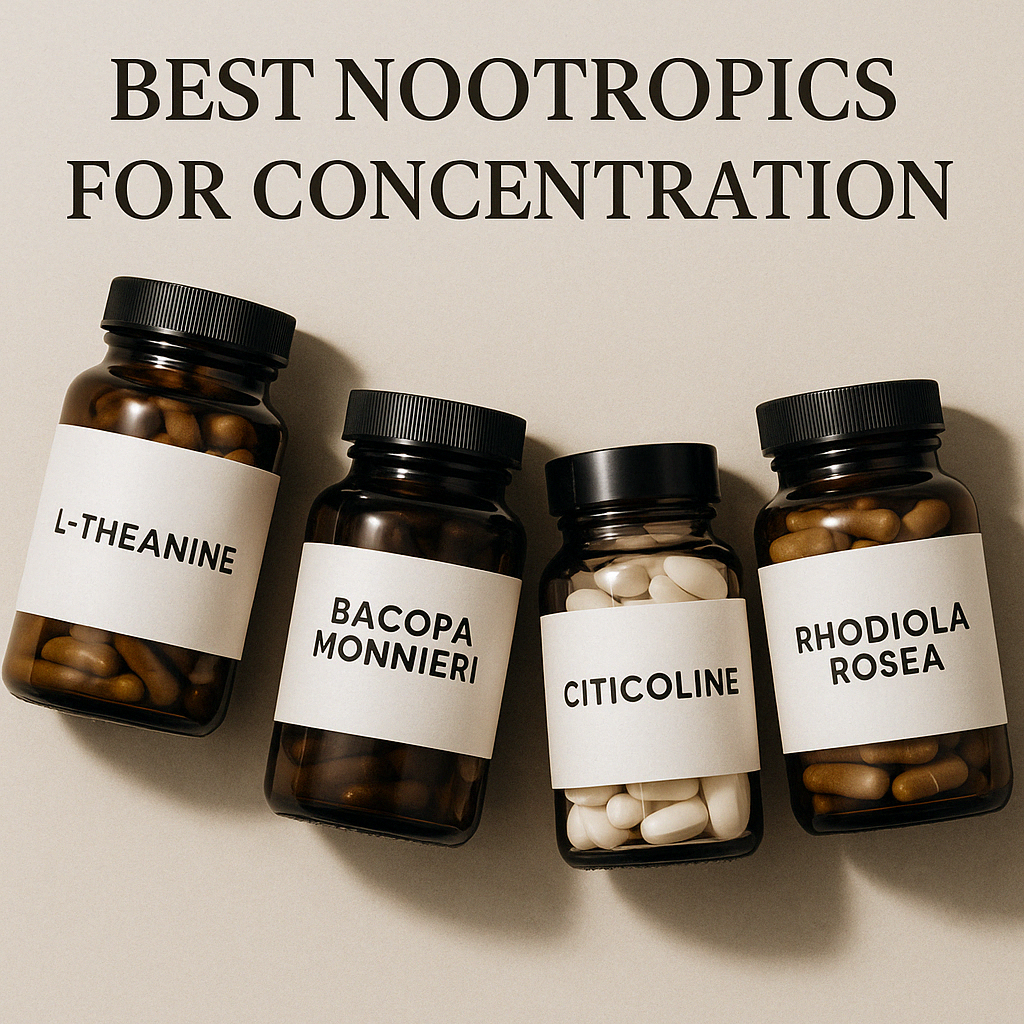Looking for the best nootropics for concentration that actually improve your mental performance?
Staying focused in a world full of distractions is one of the greatest challenges of our time. Notifications, multitasking, and cognitive fatigue sabotage productivity. That’s why more professionals, students, and creators are turning to best nootropics for concentration — supplements designed to improve attention, memory, and clarity without the jitters or crashes.
Unlike caffeine or stimulants, these nootropics support long-term brain function. They don’t just make you feel wired — they help you think clearer, longer, and deeper.

Why Nootropics Help with Concentration
The best nootropics for concentration work by improving brain circulation, enhancing neurotransmitter activity, and supporting stress resilience. Ingredients like L-Theanine promote calm alertness, while compounds like Rhodiola Rosea help your brain manage fatigue and pressure.
Others, such as Citicoline and Alpha-GPC, increase acetylcholine — a neurotransmitter linked to memory and learning. These nootropics boost your ability to stay in deep work mode without relying on raw energy or stimulation.
They’re especially useful in the afternoon when focus tends to drop. By sustaining attention and reducing cognitive noise, you get more done with less effort. The effects build over time, creating a sharper, more productive baseline.
Used correctly, they don’t make you superhuman — they help you become consistent.
How to Choose the Best Nootropics for Concentration
Not all nootropics are equal, and not every brain responds the same. That’s why the best nootropics for concentration are the ones that align with your personal needs. If you need mental energy, try Rhodiola or Panax Ginseng. For learning, Citicoline or Bacopa Monnieri may be better.
If your work involves creativity, try L-Theanine paired with caffeine. For memory tasks, Lion’s Mane and Alpha-GPC offer solid benefits. You can even mix and match — but always start with one compound, track results for 1–2 weeks, and then build your stack based on real feedback.
Key signs a nootropic works: deeper work sessions, faster task switching, better recall, and less procrastination. If you’re not noticing these after two weeks, it might not be the right fit.
How Lifestyle Affects Supplement Performance
Supplements only amplify what your lifestyle allows. Even the best nootropics for concentration won’t override sleep deprivation, poor nutrition, or digital burnout. Think of them as support tools — not solutions by themselves.
Sleep, hydration, breaks from screens, and regular movement all make your brain more responsive to nootropics. Without this foundation, effects will be shallow or inconsistent. With it, improvements can feel like leveling up your cognition.
Time-block your day. Use ambient music. Cut distractions. Then layer in nootropics. The synergy makes a difference you can measure. If possible, cycle certain compounds to avoid tolerance. For example, 5 days on, 2 days off for Rhodiola or Alpha-GPC.
Tracking Results and Measuring Impact
The only way to know if your stack is working is to track. Use tools like Notion, Daylio, or a simple spreadsheet to log sleep, focus levels, energy, and mood. Small wins matter — fewer tabs open, more tasks completed, easier decision-making.
Some of the best nootropics for concentration take weeks to peak. Lion’s Mane, for example, needs 2–3 weeks for neuroplasticity benefits. Others like caffeine + L-Theanine work within the hour. Knowing what to expect helps you assess realistically.
You can also test performance with apps like Brain.fm, Focusmate, or productivity trackers like RescueTime. These tools help you see the compound’s impact beyond just how you feel.
Combining Nootropics with Systems
No supplement can replace structure. But the right nootropic + productivity system = compounding benefits. Take Citicoline before starting a Pomodoro block. Use L-Theanine before your most cognitively demanding task. Rhodiola is excellent during mental fatigue windows — like late afternoons.
Try using focus timers, energy-matched task batching, or time-of-day stacking. These small tweaks can dramatically improve your response to supplements. That’s why clinical studies always highlight that context and routine matter almost as much as dosage.
The takeaway? Nootropics are tools — and tools work best when used inside a system.
Popular Stacks That Actually Work
Here are real-world stacks used by professionals:
- Students: L-Theanine + caffeine for study sprints, Bacopa for long-term memory.
- Writers & Designers: Lion’s Mane + Alpha-GPC + focus music for flow.
- Entrepreneurs: Rhodiola + Citicoline + time-blocking system for cognitive endurance.
The best nootropics for concentration are the ones that integrate seamlessly into your life. Adapt your stack to the task, time of day, and level of mental demand. No need for exotic or expensive pills — consistency wins.
Explore more in our focus tool reviews and stack guide.
Building a Long-Term Advantage
Over time, consistent nootropic use with smart systems builds real capacity. You’ll notice you’re less reactive, more proactive, and able to stay in high-focus zones longer. That’s when you move from “needing” a boost to owning your cognitive rhythm.
The best nootropics for concentration aren’t shortcuts — they’re accelerators. They help reinforce the behaviors and structures that already work, turning clarity into a repeatable state instead of a rare spark.
Track. Refine. Stick to what works. That’s how long-term clarity becomes your default mode.
Final Thoughts
In an age where mental clarity is your greatest edge, best nootropics for concentration offer a science-backed way to focus deeper and work smarter. But only when used with intention.
Start with one compound. Pair it with a system. Observe the results. And evolve your stack as you learn what truly fuels your focus.
Your brain is your most powerful asset — treat it like your best investment.
Ready to Take Action?
Start applying these insights today — and discover what real focus feels like.
